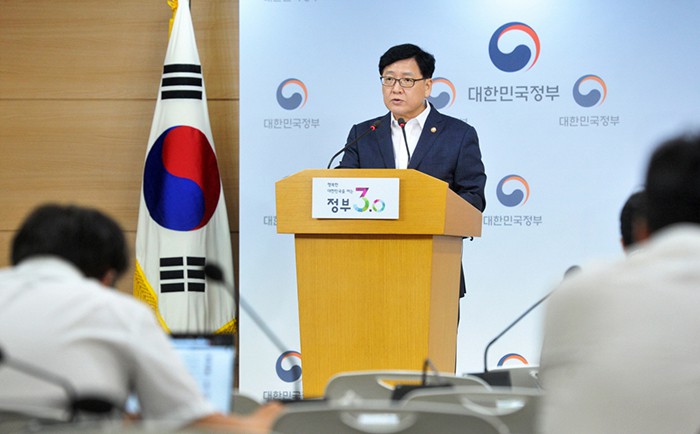
Minister of Health and Welfare Chung Chinyoub delivers a briefing about the government’s new measures to tackle the issue of low birthrates.
Starting next month, the government will expand infertility treatment support to couples at all income levels.
It will also raise the monthly allowance for male workers who choose paternity leave after having a second child, up to KRW 2 million from KRW 1.5 million.
The government announced its “Newborns 20,000+α” measures to increase the nation’s low birth rate, during a state policy meeting presided over by Prime Minister Hwang Kyo-ahn on Aug. 25.
The latest measures focus on extending infertility treatment support to all couples. This is because the government will get rid of income limits for couples who are entitled to such support, and increase the amount and number of support for those in low income brackets. Couples who experience difficulties in getting pregnant need costly medical treatment, such as artificial fertilization or in vitro fertilization. Until now, the government has been supporting couples who earn less than 150 percent of the average monthly income of urban workers, which is estimated at KRW 5.83 million. Starting next month, however, couples at all income levels can receive such benefits.
The government will also expand the range and number of infertility treatments for couples who earn less than 100 percent of the average monthly income, about KRW 3.16 million per month. Therefore, starting next month, they can receive up to KRW 9.6 million worth of benefits, as they will be reimbursed KRW 2.4 million per treatment, up to four times, which used to be KRW 1.9 million per treatment for up to only three rounds.
Minister of Health and Welfare Chung Chinyoub said, “The government sought pregnancy support measures, focusing on extending benefit for infertility treatment support, forming a virtuous circle between home and work and pregnancy support policies, depending on the number of children.”
“The government will bolster support for them so that more couples can have their first child. The changed policy will benefit 96,000 people, from the current number of only 50,000 recipients,” Chung added.
Systematic support will also be strengthened for female workers so that they can feel more comfortable getting pregnant and raising children. The government will focus on monitoring work places to see whether or not employers adhere to shorter working day rules for pregnant workers. Under the shorted working hour system, pregnant women can work two hours less and receive the same salary if they are in their first 12 weeks, and after 36 weeks of pregnancy.
The paternity leave allowance will be also increased. Starting next July, when a male worker goes on paternity leave after the birth of their second child they can receive paternity leave allowances of up to KRW 2 million for three months, up from the current KRW 1.5 million.
Finally, households with at least three children will be guaranteed prioritized admission to public child care centers and national rental housing units.
By Yoon Sojung
Korea.net Staff Writer
Photo: Ministry of Health and Welfare
arete@korea.kr























